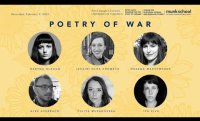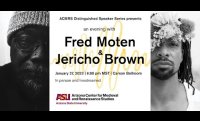Are you looking for a home for your debut poetry collection? Try submitting to the Marystina Santiestevan First Book Prize from Conduit Books & Ephemera, which offers a prize of $1,500, publication, and 30 author copies of the book for the winning author.
Submit a manuscript of 48 to 90 pages with a $25 entry fee by July 7. Bob Hicok will judge. Visit the website for complete guidelines.
Conduit Books & Ephemera was founded in 2018 in celebration of the twenty-fifth anniversary of Conduit, a biannual literary journal of poetry and prose. Hicok sponsored the inaugural Marystina Santiestevan First Book Prize, named after his grandmother-in-law, “a great supporter of young poets.” The annual prize goes to a poet writing in English who has yet to publish a full-length poetry collection. Those who submit are advised to familiarize themselves with Conduit, a magazine “which champions originality, intelligence, irreverence, and humanity.” The press also offers the Minds on Fire Open Book Prize, open to any poet writing in English and judged by Conduit’s editorial board. Submissions for the Minds on Fire prize open August 1.












